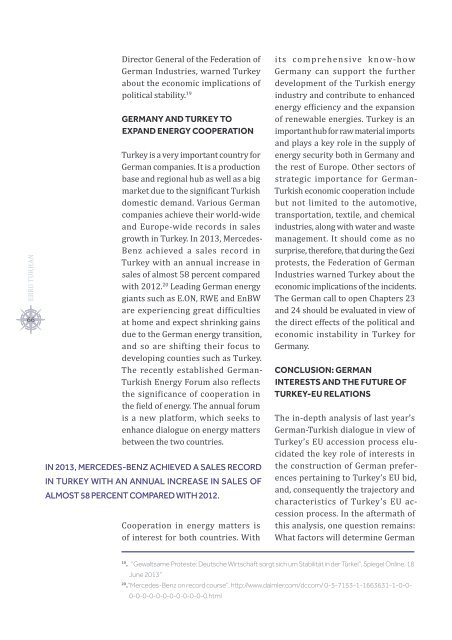Caspian Report - Issue 06 - Winter 2014
You also want an ePaper? Increase the reach of your titles
YUMPU automatically turns print PDFs into web optimized ePapers that Google loves.
EBRU TURHAN<br />
66<br />
Director General of the Federation of<br />
German Industries, warned Turkey<br />
about the economic implications of<br />
political stability. 19<br />
GERMANY AND TURKEY TO<br />
EXPAND ENERGY COOPERATION<br />
Turkey is a very important country for<br />
German companies. It is a production<br />
base and regional hub as well as a big<br />
market due to the significant Turkish<br />
domestic demand. Various German<br />
companies achieve their world-wide<br />
and Europe-wide records in sales<br />
growth in Turkey. In 2013, Mercedes-<br />
Benz achieved a sales record in<br />
Turkey with an annual increase in<br />
sales of almost 58 percent compared<br />
with 2012. 20 Leading German energy<br />
giants such as E.ON, RWE and EnBW<br />
are experiencing great difficulties<br />
at home and expect shrinking gains<br />
due to the German energy transition,<br />
and so are shifting their focus to<br />
developing counties such as Turkey.<br />
The recently established German-<br />
Turkish Energy Forum also reflects<br />
the significance of cooperation in<br />
the field of energy. The annual forum<br />
is a new platform, which seeks to<br />
enhance dialogue on energy matters<br />
between the two countries.<br />
IN 2013, MERCEDES-BENZ ACHIEVED A SALES RECORD<br />
IN TURKEY WITH AN ANNUAL INCREASE IN SALES OF<br />
ALMOST 58 PERCENT COMPARED WITH 2012.<br />
Cooperation in energy matters is<br />
of interest for both countries. With<br />
its comprehensive know-how<br />
Germany can support the further<br />
development of the Turkish energy<br />
industry and contribute to enhanced<br />
energy efficiency and the expansion<br />
of renewable energies. Turkey is an<br />
important hub for raw material imports<br />
and plays a key role in the supply of<br />
energy security both in Germany and<br />
the rest of Europe. Other sectors of<br />
strategic importance for German-<br />
Turkish economic cooperation include<br />
but not limited to the automotive,<br />
transportation, textile, and chemical<br />
industries, along with water and waste<br />
management. It should come as no<br />
surprise, therefore, that during the Gezi<br />
protests, the Federation of German<br />
Industries warned Turkey about the<br />
economic implications of the incidents.<br />
The German call to open Chapters 23<br />
and 24 should be evaluated in view of<br />
the direct effects of the political and<br />
economic instability in Turkey for<br />
Germany.<br />
CONCLUSION: GERMAN<br />
INTERESTS AND THE FUTURE OF<br />
TURKEY-EU RELATIONS<br />
The in-depth analysis of last year’s<br />
German-Turkish dialogue in view of<br />
Turkey’s EU accession process elucidated<br />
the key role of interests in<br />
the construction of German preferences<br />
pertaining to Turkey’s EU bid,<br />
and, consequently the trajectory and<br />
characteristics of Turkey’s EU accession<br />
process. In the aftermath of<br />
this analysis, one question remains:<br />
What factors will determine German<br />
19<br />
. “Gewaltsame Proteste: Deutsche Wirtschaft sorgt sich um Stabilität in der Türkei”, Spiegel Online, 18<br />
June 2013”<br />
20<br />
.“Mercedes-Benz on record course”, http://www.daimler.com/dccom/ 0-5-7153-1-1663631-1-0-0-<br />
0-0-0-0-0-0-0-0-0-0-0-0.html










